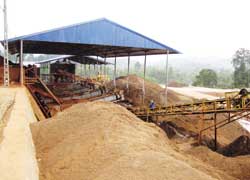Royalty tax set to see miners hit rock bottom
Vietnam’s proposed up to six-fold royalty tax increase could push foreign miners to the wall.
 The proposal could scare-off prospective mining firms |
The MoF also asked to raise the royalty tax of gemstones and rare soils from 3-8 per cent to 5-20 per cent, coal from 1-3 per cent to 5-20 per cent and natural gas from 0-10 per cent to 6-25 per cent. The MoF’s proposed levels were attributed to limiting indiscriminate mining and protecting the environment. At the same time, the hike in royalty taxes will also help Vietnam’s state coffers to earn more than the current estimates of VND6.5 trillion ($387 million) per year from royalty taxes.
At last week’s meeting with ministries of Natural Resources and Environment, Finance and Planning and Investment, a group of seven foreign firms operating in Vietnam said the proposed levels would badly affect their operations whilst the authorities could not achieve the aims they wished. David Seton, chairman and chief executive officer of Canada’s Olympus Pacific Minerals, said that the proposed royalty on gold [10-30 per cent] was far in excess of the world industry standards and would make Vietnam’s mineral industry uncompetitive with the rest of the world. Olympus Pacific Minerals has been active in Vietnam for 18 years as acting an investor in Phuoc Son and Bong Mieu gold mining projects in central Vietnam.
“Additionally, the proposed high royalty levels will significantly increase environmental damage because legal mines that operate under strict environment control would be forced out of business, leaving greater scope for illegal miners who create most of the environment damage without paying any royalties,” said Seton.
Robert Guest, chief operating officer of the Asian Mineral Resources, said that the imposition of the tax would make the Vietnamese mining sector one of the most heavily taxed in the world. “The combination of the depressed price of nickel and the inflationary environment together with the recent increase in taxes and other regulatory changes place a huge, unforeseen burden on the operation, which will significantly impact on the viability of the project,” he said.
Asian Mineral Resources has already invested more than $32 million in the ongoing construction and development of Vietnam’s first nickel mine in northern Son La province since 1993. The firm’s project is now facing a massive 400 per cent increase on export tariffs and proposed 100-600 per cent on royalty tariffs.
Andrew Lewis, general director of Nui Phao Mining Joint Venture, said Vietnam would be branded as an unsuitable and unstable destination for resource sector investment. Nui Phao began exploring tungsten, fluorspar, bismuth and copper minerals in northern Thai Nguyen province in 1996.
The $500 million project received an investment licence and mining licence in 2004 and 2005 when there were no export taxes and the royalties were in the acceptable 2-5 per cent range. “With the recently introduced 20 per cent export tariff and proposed huge royalty, the project will not get funding and investors will like elsewhere for predictability, stability and a supportive tax regime,” Lewis said.
Concerned investors also asked Vietnamese authorities for open discussions and consultations over any proposed legal framework changes, which would affect their projects.
What the stars mean:
★ Poor ★ ★ Promising ★★★ Good ★★★★ Very good ★★★★★ Exceptional
 Tag:
Tag:
Related Contents
Latest News
More News
- MAE names big 10 policy wins in 2025 (February 06, 2026 | 08:00)
- US firms deepen energy engagement with Vietnam (February 05, 2026 | 17:23)
- Vietnam records solid FDI performance in January (February 05, 2026 | 17:11)
- Site clearance work launched for Dung Quat refinery upgrade (February 04, 2026 | 18:06)
- Masan High-Tech Materials reports profit: a view from Nui Phao mine (February 04, 2026 | 16:13)
- Hermes joins Long Thanh cargo terminal development (February 04, 2026 | 15:59)
- SCG enhances production and distribution in Vietnam (February 04, 2026 | 08:00)
- UNIVACCO strengthens Asia expansion with Vietnam facility (February 03, 2026 | 08:00)
- Cai Mep Ha Port project wins approval with $1.95bn investment (February 02, 2026 | 16:17)
- Repositioning Vietnam in Asia’s manufacturing race (February 02, 2026 | 16:00)

















 Mobile Version
Mobile Version